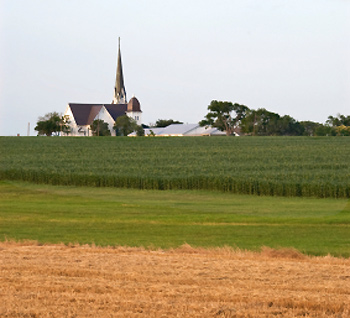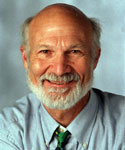Editor’s note: Faith & Leadership offers sermons that shed light on issues of Christian leadership. Matthew Floding delivered this sermon Sept. 18, 2007, at the dedication of the Ralph and Cheryl Schregardus Friendship House at Western Theological Seminary, Holland, Mich.
“I lift up my eyes to the hills -- from where will my help come?” the psalmist asks.
This is one of the great biblical questions -- like, “Where are you?” and “Who do you say that I am?”
“From where will my help come?”
The ancient Near East was an extremely religious world. This has not changed. Spiritual infidelity was a constant temptation. It remains so today.
I think Eugene Peterson, translator of “The Message,” is on the mark when he suggests that this psalm makes it clear that Israel had two chief sources from where they were tempted to seek help. And it addresses them both, with a ringing affirmation of faith and a call for personal trust and commitment to covenant relationships.
Psalm 121 is a song of ascent. Pilgrims making their way to Jerusalem sang, chanted aloud or recited to themselves this psalm. On their way to Zion, God’s holy hill, they couldn’t help but notice other hills, other high places. The psalmist surveyed these -- the places of the shrines and Asherah poles where unspeakable sacrifices took place to placate fearsome gods, and he asked, “From where will my help come?”
The psalmist turned his gaze higher still, to the heavens -- the sun, the Egyptian god; the moon, the god of the Chaldeans; the stars, studied by ancient astrologers to discern their messages and their impact on the future. These were attractive and visible gods. “From where will my help come?”
“From where will my help come?” is a huge life question to settle.
The psalmist responds to his own question, in Joshua-like fashion -- “As for me and my house, we remember and confess: ‘My help comes from the Lord, who made heaven and earth.’”
Things haven’t changed much. We still look to the high places.
Some climb the corporate ladder and aspire to the boardrooms on the 37th floor. Many look for help to Capitol Hill, to address societal ills up there in Washington (or Moscow or Tokyo or Beijing). Huge numbers of people are star-struck by astronomical athletic salaries. And everyone with an IRA or 401(k) loves the Dow Jones and Nasdaq indexes, as long as they go up.
The high places have their allure, and many place the trust of their life there.
After considering the high places, the psalmist takes us in another direction -- to a God big enough to trust, and a God personal enough to care.
The psalmist calls God “keeper”:
He who keeps you will not slumber. ...
The Lord is your keeper. ...
He will keep your life.
Sally Henningfeld knew the truth of this.
First, you must picture the community of Orange City, Iowa. Picture a lovely community platted out on one square mile. After 130-some years, it now spills over that border, though developers pose no threat to the alternating fields of corn and soybeans that surround the town.
Sally lived on a high place -- a hill just outside of town, on the northwest corner, in what was referred to for years as “the county home.” That was where her parents had deposited her and her sister, both cognitively disabled, in 1955. I had become legal guardian to this 70-year-old woman to prevent the appearance of conflict of interest over medical and financial decisions.
From the county home Sally could see the other high places.
On the town’s southwest corner stand grain elevators -- representing the financial base of the community.
At the center, the courthouse of Sioux County, Lady Justice standing proudly on top -- representing power.
South and center stands Zwemer Hall with its proud tower, the “Old Main” of Northwestern College’s campus -- representing knowledge.
Sally could see them all clearly from the park bench on the lawn -- but with this ironic twist. Though she could visually associate with these high places, her life was not about money. Social Security provided her room and board and a $35-a-month spending allowance supplemented by $1 an hour for wiping off the dining room tables.
Her life was not about education and knowledge. She loved coloring books and could manage to scrawl her own name in cursive.
Her life was not about power. She was a ward of the state, and when she finally needed to move to a nursing home, most of her belongings ended up in a dumpster within an hour’s time. There was no family to claim them and no need to store them.
But there was another high place in the town -- the church steeple.
There this woman of low estate was elevated, through participation in Friendship Bible Studies. It was from the church that she welcomed a steady trickle of visitors. The church provided the opportunity to worship with dignity with others who loved and trusted Jesus. And at her life’s end, it was the church that paid for her cemetery plot.
The Lord, who made heaven and earth, was and is Sally’s keeper.
“[And] the Lord will keep your going out and your coming in from this time on and forevermore.”









